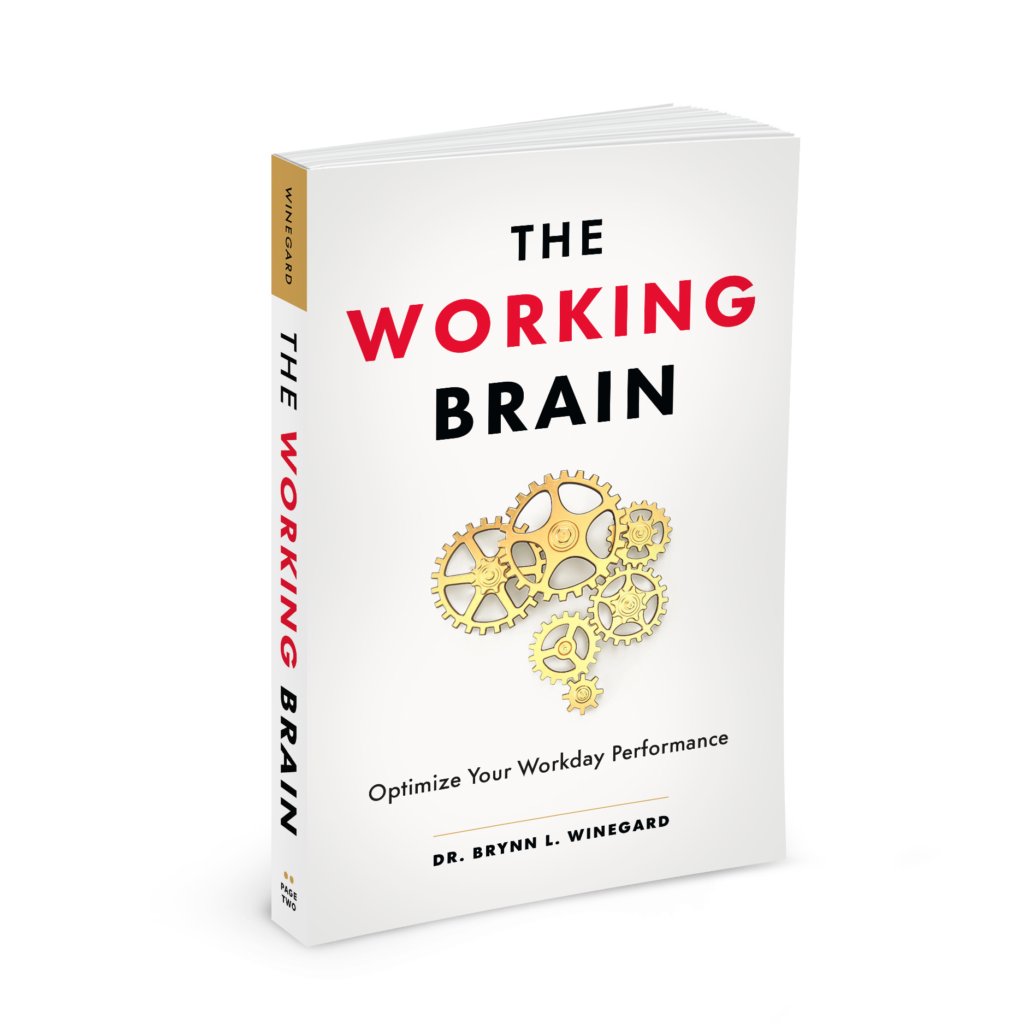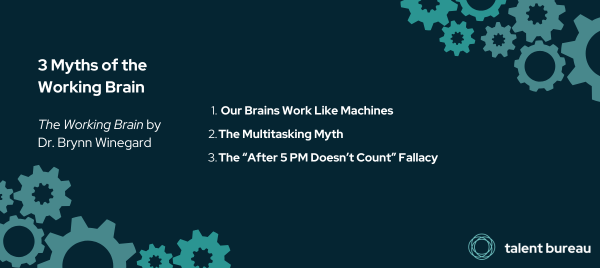Ever wonder what it takes to thrive—not just survive—in today’s high-pressure work environment? Look no further than Inside the Working Brain of Dr. Brynn Winegard (pt.1).
Dr. Brynn Winegard, neuroscientist, keynote speaker, and author of The Working Brain, is here to revolutionize how we think about our brains, workdays, and ultimately, our lives.
In this Talent Bureau exclusive interview, Brynn shares the inspiration behind her book, practical brain-boosting hacks, and surprising insights about aligning with your brain’s natural rhythms to achieve more with less effort.
The Working Brain is science-backed, relatable, and refreshingly actionable. Whether you’re a CEO making high-stakes decisions, an event planner juggling ten things at once, or anyone just trying to navigate the modern workday, this conversation will leave you empowered, inspired, and ready to work with your brain, not against it. Let’s dive inside the working brain of Dr. Brynn Winegard (pt.1)!


Brynn, The Working Brain is such a compelling title! Can you share what sparked the idea behind the book, and what made you think, “People need to know this”?
Thank you! It’s intended to be a double-entendre – both what you need to know to ensure your brain is functioning and ‘working’ properly, as well as all about the brain in the context of the workday while working.
There’s been plenty written about the brain in other contexts (while trying to be creative, while aging, while overcoming disorders, while healing, while thinking, while leading etc.) and less written about the context in which we all typically find ourselves each day: while working.
On one hand, the context of work may sound mundane, but on the other, it’s universal: we all work in some capacity or another every day.
Humans have a fundamental need and drive to learn, grow, accomplish, toil, earn, succeed, and feel satisfied with themselves and their efforts. Wouldn’t it be nice to have a manual of sorts – we think of The Working Brain as ‘the missing manual’ – for how to use your brain better during the workday?
In North American culture we spend a disproportionate amount of time at work, working, at the office and/or with colleagues, so I felt compelled to research the brain in this context and to share what I found.
The idea is all about how to understand and use your brain better, so you GET MORE out of yourself, your brain, and your workday while putting LESS IN, at least perceptually.
I’ve also often noticed that especially as it relates to the human brain, there’ve historically been so many myths, misconceptions, misunderstandings, and frankly disinformation passed around, especially through mainstream media, corporate lore, and popular culture, that I also wanted to author something that stands in service of dispelling many common mistruths.
Ultimately, The Working Brain grew from a mix of lifelong scientific fascination and identified real-world needs. I saw so many high-performing people struggle because they weren’t working “with” their brain’s natural rhythms or needs.
It struck me that understanding how our brains are wired—not just from a theoretical level, but in an actionable way—could genuinely help professionals not just perform better (cognitive optimization) but also feel better (mental wellness).
The book is a way to give working professionals practical tips, tricks, tools, and strategies – rooted in science and backed by research – to manage their mental energy, avoid burnout, take self-care to the next level, and hopefully flourish at work, during the workday, and through their careers.
See Dr. Brynn Winegard in action—watch her speaker reel and discover why she’s the perfect choice to inspire and empower your next audience!
What is something people might find surprising about your book-writing process or that might be helpful for them to know?
Something people might find surprising about my book-writing process is how deeply personal it has been.
I’ve been fascinated with the human brain for as long as I can remember, and my obsession stems from two main beliefs: first, understanding the human brain is key to unlocking human potential, whether it’s our kids, colleagues, students, or even ourselves. Second, truly grasping how the brain works can make us better at understanding and predicting other people—what they perceive, feel, think, and ultimately do—whether in our work or personal lives.
In academia, there’s a saying: “Re-search is me-search.”
That sentiment is particularly relevant to this book. The content was influenced heavily by my experiences and needs during my corporate life. For instance, I developed two avatars as guides while writing.
The first is ‘Corporate Christin,’ a newly minted MBA who feels overwhelmed in her new product management role. She’s ambitious but unsure how to navigate the demands of her life and work expectations.
The second is ‘Dan,’ a seasoned technology sales executive who constantly seeks ways to optimize his brain’s performance and gain an edge in the market by better understanding his customers and colleagues.
Interestingly, ‘Dan’ is based on a real-life friend and colleague (though I’ve changed his name), and he also happens to fit squarely into the target market for audiences I typically see in my speaking.
‘Corporate Christin’ is a fictionalized version of myself from my early corporate days, when I was grappling with many of the same challenges.
Writing for these avatars kept me focused on what to include and what ‘hit the cutting room floor’. I would often imagine what young me would ask or what ‘Dan’ and I end up discussing when we meet.
Ultimately, every decision about what to include or explain came down to these avatars as well as the questions that audience members, students, and clients have asked me over the years.
The questions and struggles they have are authentic and relatable, and that’s how the outline of the book came together. It practically wrote itself when I thought about how to have meaningful conversations with people like them—addressing what they care about, what’s relevant, and what they need to flourish, especially at work.
“Neuroscience is a ‘hot topic’ right now. For this year’s annual meeting, we wanted something different, ‘fresh’ and relevant – and Dr. Brynn fit the bill. With her combined background in BOTH neuroscience AND business, she took science-based information, and made it digestible AND applicable to our audience. She helped us ‘unravel our brains’ so we can truly understand WHY we do what we do – and why our clients do what THEY do, so we can adjust our behaviours to more effectively persuade and influence. The “ah ha!” moments were plentiful, and the Q&A that followed got us all to dig even deeper and gain even more insight to propel our success”
A. Warren, Communications Manager, Program Committee Member,
Royal Bank of Canada
Learn more about Dr. Brynn Winegard’s speaking topics here!
You’ve worked with a lot of impressive organizations and executives. What’s one of the most surprising things you’ve found about how professionals use (or misuse!) their brains at work and the myths that pervade them?
There are three, really:
1. The Industrialized Expectation that ‘Our Brains Work Like Machines’
Many professionals seem to believe that their brains should function like computers, maintaining a constant ‘peak mode.’
This is partly due to outdated notions from the Industrial Revolution about labour and work, combined with the metaphorical language we use to describe the brain. Our brains, however, don’t work this way.
They have natural cycles, known as ultradian rhythms, that alternate between periods of high focus and inevitable dips in energy throughout the day. Trying to force productivity without honouring these cycles leads to burnout and subpar results.
To optimize brain function, we need to work with these rhythms, taking breaks when our brain signals the need. I often tell audiences that the quality of your output will only be as good as the quality of your rest and recovery.
2. The Multitasking Myth
Another widespread misconception is that multitasking enhances efficiency.
Neuroscience shows that the human brain cannot perform multiple high-cognitive-demand tasks simultaneously. Instead, it switches between tasks, causing cognitive ‘switching costs’ that sap energy and decrease overall productivity.
Multitasking can make you feel busier, but it doesn’t make you more effective. The better approach is to focus deeply on one task at a time, embracing the power of single-tasking to achieve peak performance.
3. The ‘After 5 PM Doesn’t Count’ Fallacy
Finally, many professionals mistakenly think that what they do outside work hours has no impact on their work performance. The truth is that our brains are holistic systems affected by everything we do: how we eat, sleep, move, and engage with others.
Poor sleep or unhealthy habits, even in your private life, compromise cognitive abilities, decision-making, and emotional regulation at work. Taking care of your brain means maintaining good habits all day, every day—not just during working hours.
Addressing these myths has helped countless professionals I’ve worked with harness their true cognitive potential, making workdays more efficient, fulfilling, and sustainable.

(Inside the Working Brain of Dr. Brynn Winegard Interview continued in Part 2)
There you have it—just a taste of Dr. Brynn Winegard’s expertise in understanding how our brains tick during the workday.
From breaking down myths like the multitasking trap to teaching us how to embrace our brain’s natural rhythms, Brynn is already dropping gold. But guess what? We’re just getting started.
In Part 2 of Dr. Brynn Winegard’s interview, we’ll dive deeper into her transformative MERIT framework and discover brain hacks you can put to use right now to boost your productivity, mental wellness, and overall performance.
Trust me, you don’t want to miss what’s coming next—it might just change how you work forever.
If you’re looking to inspire your team or elevate your next event, book Brynn as a keynote speaker. Her dynamic, research-backed approach will have your audience engaged, enlightened, and ready to conquer the world.
The Working Brain is launching officially on December 3rd! Stay tuned for details on how you can grab your copy. It’s the ultimate guide to transforming how you think, work, and succeed.
Want to find more keynote speakers like Dr. Brynn Winegard? Check out our roster or contact us!
Join our online community. Follow Talent Bureau on social media.
“Dr. Brynn L. Winegard masterfully distills the wisdom of mind-body and lifestyle medicine into a succinct framework.”
Dr. Edward Phillips, physician and professor of physical medicine at Harvard Medical School
